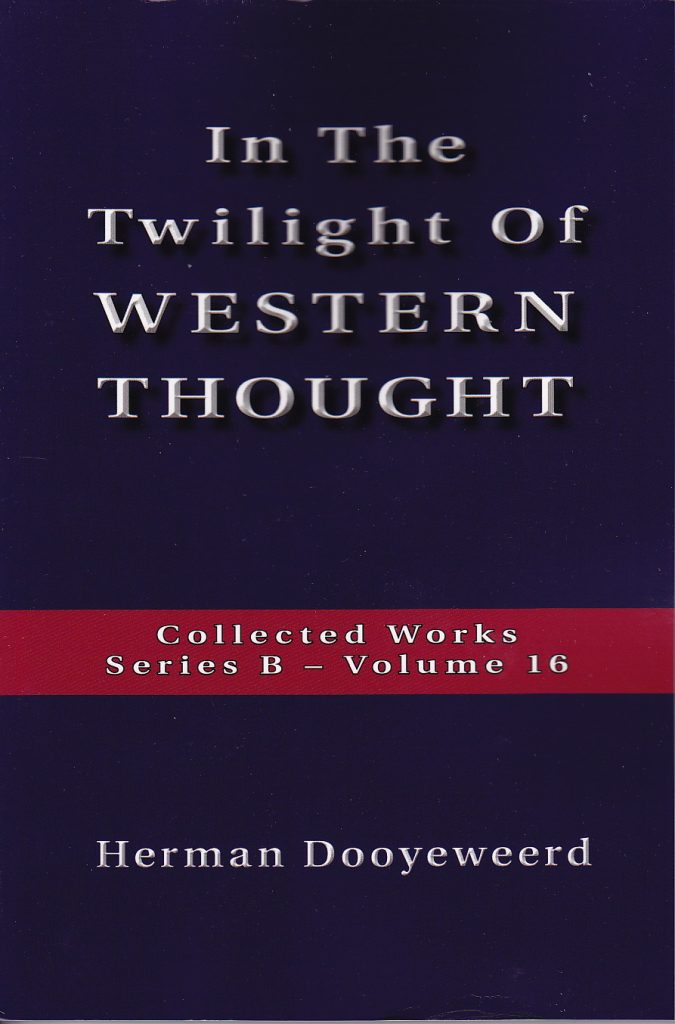So far in our journey through Herman Dooyeweerd’s book In the Twilight of Western Thought, we have explored key concepts related to the development of a distinctly Christian philosophy. But, because Dooyeweerd intends to develop a philosophy that is radically (literally, from the root) Christian, the question he comes to in chapters five through seven is not surprising: how does philosophy relate to theology?

Immediately, I expect, those of us who are neither philosophers nor theologians might assume that this section isn’t relevant for us. In reality, for every Christian scholar – in any field of academic work – this section is essential. This is because every Christian scholar should be able to thoughtfully relate their faith to their scholarship.
I have sat with many graduate students over the years who have asked: what does my Christian faith have to do with my work as an engineer, mathematician, doctor, etc.? Most answers revolve around matters of personal morality and ethics. “I should design information systems honestly.” “I should evangelize my co-worker.” “I shouldn’t cheat on my fees or taxes.”
There’s nothing wrong with these as starter answers, but they aren’t enough. Dooyeweerd helps us reflect philosophically and theologically on the deeper dimensions of how Christ, who is Lord of all, calls us to bring all of who we are to our callings and vocations in the world.
Dooyeweerd covers a vast terrain in these chapters and our conversations are already showing how different people may find different bits to be particularly relevant. But as a whole, these chapters challenge us to reflect on the uniquenesses of three main concepts: faith, theology, and philosophy.

Faith, for Dooyeweerd, is the orientation of the heart toward or in rebellion against God. It is one’s posture to God: one’s receptivity to God and God’s revelatory Word. Faith is the gift we receive that places us within the redemptive-historical framework of Scripture (Creation-Fall-Redemption). In this sense, faith is one’s relational experience (sometimes called “knowledge”) of God . In Dooyeweerd’s terms, “the true knowledge of God and of ourselves … surpasses all theoretical thought” (84).

Faith is different from theology. Whereas faith is one’s precritical orientation towards God in the heart, theology is the theoretical reflection on faith. Theology is faith (or articles of faith) considered as an object of scientific inquiry. As such, theology is a fallible human work: “Christian theology is bound to theoretical human thought which cannot claim the infallibility of God’s Word … If our salvation be dependent on theological dogmatics and exegesis, we are lost. For both of them are a human work, liable to all kinds of error, disagreement in opinion, and heresy” (80, 93). An analogy here may help: faith is to theology as life is to biology. Or, as Dooyeweerd puts it the other way round, “theology can no more give us such a theoretical total-view than biology can” (89).
And then there is philosophy. Philosophy is the attempt to understand how all the various elements of reality fit together, cohere, and have their meaning as a whole. Dooyeweerd is clear that reality is a whole, a seamless unity (in the one Creator God). This means that every dualism (sacred/secular, for instance) is a false conception of reality. Dooyeweerd says, “The whole distinction between a so-called sacred theology and the so-called secular sciences issued from an unbiblical dualism inherent in the scholastic basic motive of nature and supra-natural grace” (97).
I have found that one of the most significant implications of Dooyeweerd’s view for Christian scholars is that our faith (our pre-critical experience of being in relationship with God from the heart, the foundation of our being) reveals all of reality to us as God’s Creation. Within this Creation (fallen yet being renewed), we have our place and our work: our academic field requiring investigation. No field is better or less worthy than another (though some fields may be more pressing due to their particular context), but the key insight from Dooyeweerd is that our faith, combined with our sustained reflection on that faith (theology), is the means by which God reveals to us where sin’s distorting effects need patient redemptive attention in absolutely any field of research.

The result, for me, is that the whole world opens up as the field where God sends his workers with joy. This work is not limited to our personal ethics or individual evangelistic attempts. Rather, the one Creator God calls and equips us to be his imagebearers who steward his beloved Creation within an overarching and supporting love, grace, and hope. We can engage in our academic work because God so loves the world … and because academic work is one more way to gratefully love the Lord our God with heart, mind, and soul.
- Biblical – Not Biblicist – Scholarship - July 3, 2023
- How ‘biblical’ is “Biblical Critical Theory”? - June 6, 2023
- The Importance of Culture for Academics - May 8, 2023



2 Comments
Richard Gunton · May 11, 2022 at 3:09 pm
Thanks for tying these concepts together so clearly, Mike. I once invited a university friend to a Christian event and he said “I guess it’s not for me.” You’ve pointed out that faith is for everyone – and so are theology, and philosophy. I suppose Dooyeweerd’s work helps us see how everyone already has faith rooted in something, and so we all need to take an interest in the theology (or maybe sometimes atheology?) and philosophy that go with the faiths to be found in and around us.
Mark Roques · May 13, 2022 at 5:40 pm
Thanks Mike for this excellent post. You cover a lot of ground clearly and engagingly. It is so helpful to clarify the difference between faith, theology and philosophy. Very insightful. I hope your blogs on Dooyeweerd will turn into a book!
Comments are closed.